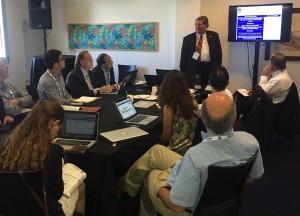Space Universities Administrative Committee (SUAC) (2024-2027)


Committee Members
See all members
Members
• AUGUADO AGELET Fernando
• BELOKONOV Igor V.
• BERNELLI-ZAZZERA Franco
• CORPINO Sabrina
• GUERMAN Anna
• GRUNTMAN Mike
• GURBANOV Bahram
• JORDAAN Hendrik Willem
• KUMAR Anil
• MISHRA Deepak
• OPROMOLLA Roberto
• VAIDYANATHAN Aravind
• ZENOU Emmanuel
Objective/scope of the committee
The purpose of this Committee is to encourage the international collaboration among academic structures involved in space activities, including technical and non-technical universities, etc., and in particular all players such as administration and management (President and Deans), professors, students, PhD and researchers.
The Committee is building an international network of Space Universities aiming at:
- Promoting the universities’ activities and curricula during the IAC through an exhibition of posters in the IAF Global Networking Forum,
- Discussing modalities for student groups from universities to attend the IAC at a discounted rate,
- Participating in the International Meeting of Presidents of Space Universities, and
- Providing a forum to discuss ways to train the next generation of space practitioners.
Committee rules for membership applications and renewal
IAF-SUAC is composed of representatives from member universities of the IAF.
- The Committee Chair is elected by the Committee and appointed by the IAF Bureau and must be a member of an IAF Member organisation. The term of office of the Chair is three years, with the possibility of one re-election for an additional term.
- The Committee Chair can nominate regional Vice-Chairs to ensure a global representation of the Committee. The Committee Vice-Chairs shall represent an IAF Member organisation. The Chairmanship will rotate with the Vice-Chair at the end of his term.
- The Committee Members shall be proposed by the Members’ Organisations and accepted by the Committee. The Committee Members should represent an IAF Member organisation.
Symposiums/sessions and events at the iac
The Committee is planning to organise a technical session on University Satellites (title TBC) in cooperation with the Space Education and Outreach Committee (SEOC), to be held for the first time during IAC 2013 in Beijing, China.
Technical meetings or events outside of the iac
International Meeting of Presidents of Space Universities The IAF and the Committee organised two meeting where the Presidents and Deans of the world’s major space universities gathered to:
- Exchange views on academic matters, courses, exchange of students, fellowship opportunities, development of master programmes, etc.,
- Share best practices of cooperation,
- Establish new partnerships and projects based on international cooperation, and
- Promote the participation of students in the IAC, IAF Global Conferences and regional workshops.
This meeting was first held during the IAC 2009 in Daejeon, South Korea, the second in Paris during the Spring Meetings in March 2012.
International CubeSat Workshop The IAF and the Committee organise a yearly workshop to gather the international CubeSat community to discuss the latest developments, address national needs, foster international collaboration to undertake new space missions and to share best practices and design recommendations that would protect the long-term sustainability of the space environment. The first was hold in Cape Town, South Africa in 2009 and the next meeting is foreseen for the week before IAC 2013 in Beijing, China.
Studies undertaken by the committee
This Committee has established several working groups to deal in a more effective manner with the different studies undertaken by the Committee:
IAF Launch Partnership Initiative
This working group looks into ways of using the IAF network to facilitate access to launch opportunities for small satellites with an educational or humanitarian mission, as well as access to research facilities for student projects based on international cooperation.
Distributed Space Missions Working Group
The objective of this working group is to define the interfaces that would allow university missions to cooperate in orbit, to encourage such cooperation and to propose new distributed missions.
Ground Stations Working Group
This working group will coordinate the tracking facilities existing at the premises of universities member of the IAF, and will coordinate the collection of the data generated by university missions.
Other committee activities
The Committee is defining the structure of a database of space-related educational and humanitarian projects, which would allow the identification of research opportunities open for international cooperation.